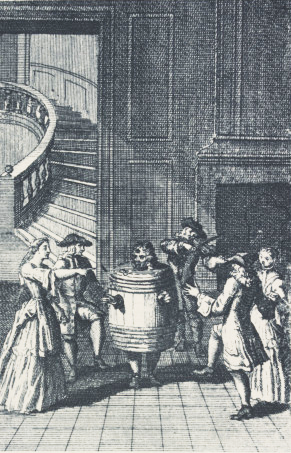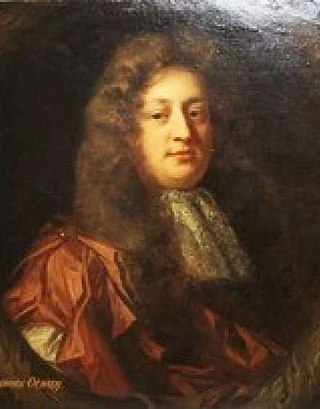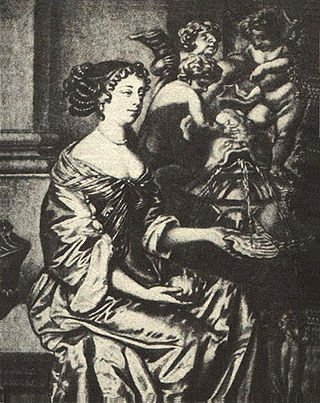Related Research Articles

Aphra Behn was an English playwright, poet, prose writer and translator from the Restoration era. As one of the first English women to earn her living by her writing, she broke cultural barriers and served as a literary role model for later generations of women authors. Rising from obscurity, she came to the notice of Charles II, who employed her as a spy in Antwerp. Upon her return to London and a probable brief stay in debtors' prison, she began writing for the stage. She belonged to a coterie of poets and famous libertines such as John Wilmot, Lord Rochester. Behn wrote under the pastoral pseudonym Astrea. During the turbulent political times of the Exclusion Crisis, she wrote an epilogue and prologue that brought her into legal trouble; she thereafter devoted most of her writing to prose genres and translations. A staunch supporter of the Stuart line, Behn declined an invitation from Bishop Burnet to write a welcoming poem to the new king William III. She died shortly after.

"Restoration comedy" is English comedy written and performed in the Restoration period of 1660–1710. Comedy of manners is used as a synonym for this. After public stage performances were banned for 18 years by the Puritan regime, reopening of the theatres in 1660 marked a renaissance of English drama. Sexually explicit language was encouraged by King Charles II (1660–1685) personally and by the rakish style of his court. Historian George Norman Clark argues:
The best-known fact about the Restoration drama is that it is immoral. The dramatists did not criticize the accepted morality about gambling, drink, love, and pleasure generally, or try, like the dramatists of our own time, to work out their own view of character and conduct. What they did was, according to their respective inclinations, to mock at all restraints. Some were gross, others delicately improper.... The dramatists did not merely say anything they liked: they also intended to glory in it and to shock those who did not like it.

Thomas Otway was an English dramatist of the Restoration period, best known for Venice Preserv'd, or A Plot Discover'd (1682).

Oroonoko: or, the Royal Slave is a work of prose fiction by Aphra Behn (1640–1689), published in 1688 by William Canning and reissued with two other fictions later that year. It was also adapted into a play. The eponymous hero is an African prince from Coramantien who is tricked into slavery and sold to European colonists in Surinam where he meets the narrator. Behn's text is a first-person account of Oroonoko's life, love, rebellion, and execution.

Restoration literature is the English literature written during the historical period commonly referred to as the English Restoration (1660–1689), which corresponds to the last years of Stuart reign in England, Scotland, Wales, and Ireland. In general, the term is used to denote roughly homogenous styles of literature that centre on a celebration of or reaction to the restored court of Charles II. It is a literature that includes extremes, for it encompasses both Paradise Lost and the Earl of Rochester's Sodom, the high-spirited sexual comedy of The Country Wife and the moral wisdom of The Pilgrim's Progress. It saw Locke's Treatises of Government, the founding of the Royal Society, the experiments and holy meditations of Robert Boyle, the hysterical attacks on theatres from Jeremy Collier, and the pioneering of literary criticism from John Dryden and John Dennis. The period witnessed news becoming a commodity, the essay developing into a periodical art form, and the beginnings of textual criticism.
Elizabeth Polewheele, playwright, was one of the first women to write for the professional stage in Restoration London.

Mary Saunderson (1637–1712), later known as Mary Saunderson Betterton after her marriage to Thomas Betterton, was an actress and singer in England during the 1660s and 1690s. She is considered one of the first English actresses.

Love-Letters Between a Nobleman and His Sister is a three-volume roman à clef by Aphra Behn playing with events of the Monmouth Rebellion and exploring the genre of the epistolary novel. The first volume, published in 1684, lays some claim to be the first English novel. Some scholars claim that the attribution to Behn remains in dispute. The novel is "based loosely on an affair between Ford, Lord Grey of Werke, and his wife's sister, Lady Henrietta Berkeley, a scandal that broke in London in 1682". It was originally published as three separate volumes: Love-Letters Between a Noble-Man and his Sister (1684), Love-Letters from a Noble Man to his Sister: Mixt with the History of Their Adventures. The Second Part by the Same Hand (1685), and The Amours of Philander and Silvia (1687). The copyright holder was Joseph Hindmarsh, later joined by Jacob Tonson.

The Feign'd Curtizans, or, A Nights Intrigue is a 1679 comedic stage play by the English author Aphra Behn. Behn dedicated the play, originally performed at the Duke's Company in London, to the well-known actress and mistress of King Charles II, Nell Gwyn.
Anne Shadwell was an English stage actor of the seventeenth century. She was one of the first English actresses to appear on stage following the Restoration She was one of six actors recruited in 1660 by William Davenant for the new Duke's Company, acting under her maiden name Anne Gibbs. Sometime between 1663 and 1667 she married the playwright Thomas Shadwell with whom she had four children. While some sources have her acting late into the century, it may be she effectively retired with the formation of the United Company in 1682. Her appearances had decreased since 1672. Following her husband's death in 1692 she was left the bulk of his estate. She had an investment in the Drury Lane Theatre in 1709, when she joined a petition to Queen Anne by the manager Christopher Rich, but nothing is known about her after this point.
Mary, Lady Slingsby, born Aldridge, was an English actress. After a marriage lasting 1670 to 1680 to John Lee, an actor, during which she was on the stage as Mrs. Lee, she was widowed. She then married Sir Charles Slingsby, 2nd Baronet, a nephew of Sir Robert Slingsby, and performed as Lady Slingsby. Theatre historians have pointed out the difficulty in identifying her roles in the period when Elinor Leigh, wife of Anthony Leigh, was performing as Mrs. Leigh, because the homophones "Lee" and "Leigh" were not consistently spelled at the time.
The Younger Brother, or, The Amorous Jilt is a comedy written by Aphra Behn. The play was first performed and published posthumously in 1696, but was probably written in the late 1680s.
Like Father, Like Son, or The Mistaken Brothers is a lost play written by Aphra Behn, first performed by the Duke's Company in 1682.

The Young King, or, The Mistake is a tragicomedy written by Aphra Behn. It was probably written during the 1660s, but was not staged until 1679. It explores notions of kingship and divine right, and gender and heroism.
Elizabeth Currer was an Irish stage actress of the Restoration Era. She was a member of the Duke's Company during the 1670s and subsequently part of the merged United Company from 1682. Although she was likely acting in London several years earlier than this, her first known role was in The Conquest of China in 1675. Due to the irregular spelling of the time her surname is sometimes written as Carrier, Corer and Currier amongst other variants.
John Young was an English stage actor of the seventeenth century. He was active as a member of the Duke's Company during the Restoration Era, appearing at Lincoln's Inn Fields and then at the Dorset Garden Theatre when the company relocated. While not much is known about his background, he was repeatedly in debt during his acting career. In 1667 he stood in for Thomas Betterton after he fell ill during the run of Macbeth appearing as the title role. Samuel Pepys described him as "a bad actor at best".
John Richards was an English stage actor of the seventeenth century. An early member of the Duke's Company in London, he was lured away to the new Smock Alley Theatre in Dublin by John Ogilby. He was back with the Duke's at the Dorset Garden Theatre from the mid-1670s, but while in Ireland he was able to play major roles his English performances were generally supporting parts.
Thomas Percival or Percivall was an English stage actor of the seventeenth century. He was a member of the Duke's Company from 1671 to 1682 and then the merged United Company until 1686. Throughout his career he was confined to playing supporting roles, never graduating to major parts. He was the father of the actress Susanna Verbruggen. In 1693, following his retirement from the stage, he was arrested for coin clipping, a capital crime, for which he was sentenced to hang at Tyburn. The intercession of his daughter with Mary II saw his sentence commuted to transportation, but before he reached Portsmouth he died of natural causes.
John Crosby was an English stage actor of the Restoration Period. He first recorded performance is in 1662 when he appeared in Ignoramus at Whitehall Palace, likely as a child actor. It was further eight years before he was solidly established in the Duke's Company in 1670 beginning with The Forc'd Marriage by Aphra Behn. He became a regular with the company over the following decade, often playing young lover roles. He retired from the stage in 1679 and later became a justice of the peace for Middlesex. He died on 8 April 1724 and was buried in St Sepulchre.
Edward Angel was an English stage actor of the early Restoration Era. Along with James Nokes and Cave Underhill he was one of the leading comedians of the period. It is possible he began his career as a boy actor during the pre-English Civil War era, but he was an experienced actor by the time he was a member of John Rhodes's troupe in 1660. From 1662 he acted with the Duke's Company, initially at Lincoln's Inn Fields and after 1671 at the new Dorset Garden Theatre.
References
- ↑ Brown, Susan, Patricia Clements and Isobel Grundy, eds. Results of Tag Search Query on Behn, Aphra, within tag NAME within Orlando: Women's Writing in the British Isles from the Beginnings to the Present. Cambridge: Cambridge University Press Online, 2006 <http:Orlando.cambridge.org/> 06 March 2015
- ↑ Janet Todd, 'Behn, Aphra (1640?-1689)', Oxford Dictionary of National Biography, Oxford University Press, 2004.
- 1 2 O'Donnell, Mary Ann (2004). Aphra Behn: An Annotated Bibliography of Primary and Secondary Works (Second ed.). Ashgate.
- 1 2 Van Lennep; et al. (1960). The London Stage, 1660-1800, pt. 1 (1st ed.). Carbondale: Southern Illinois University Press. p. 175. hdl:2027/mdp.39015020696632.
- 1 2 Todd, Janet. "Behn, Aphra". Oxford Dictionary of National Biography . Oxford University Press.
{{cite web}}: Missing or empty|url=(help)
